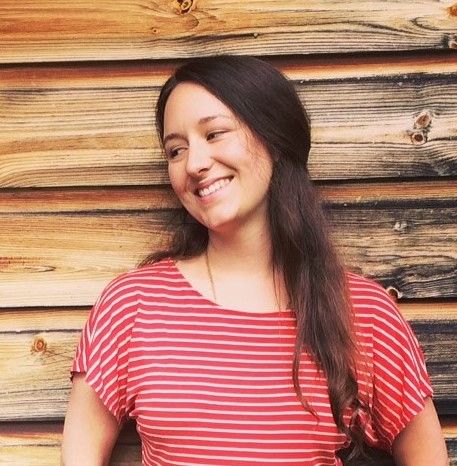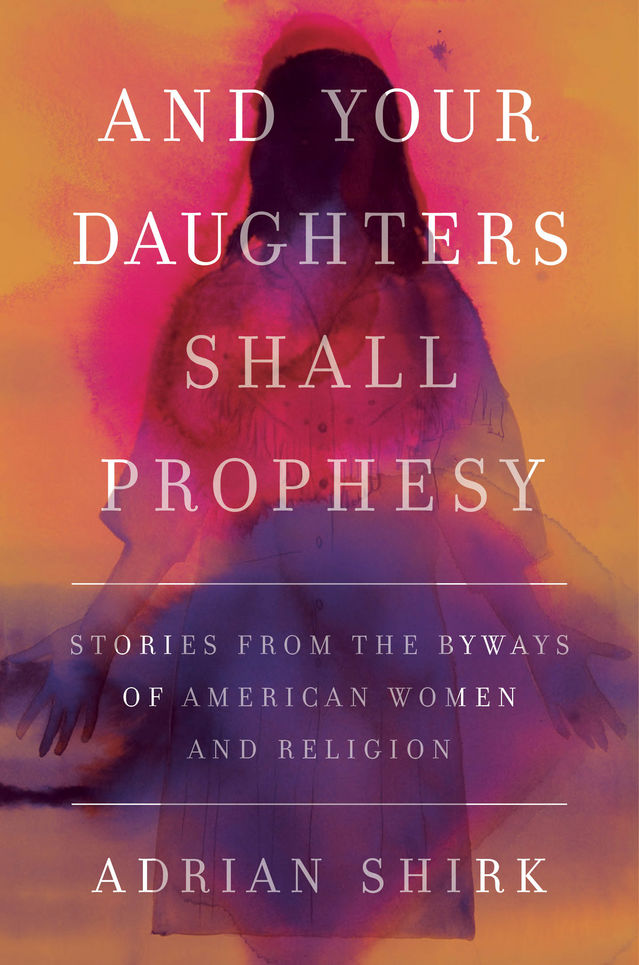Religion
Is it Time to Bring Back Mysticism?
Adrian Shirk's new book explores spiritualism, diagnosis & avant-garde agitation
Posted August 22, 2017
Is social justice ready to get reacquainted with religion? What can Mary Baker Eddy, Marie Laveau, Sojourner Truth, and Linda Goodman teach us about how to live a full life now? Ariel Gore talks to Adrian Shirk about civil rights, mental illness, and radical communion.

Adrian Shirk is one of the great millennial thinkers. Her new book, And Your Daughters Shall Prophesy: Stories from the Byways of American Women and Religion, offers both history and inspiration for finding new ways forward via the spiritual quest.
Immersed in the feminist literary tradition of personal-sociological hybridity, And Your Daughters Shall Prophesy—at once spiritual biography and autobiography—explores connections between mental illness and religious opening, and highlights the American legacy of secular-religious alliances for social justice.
Ariel Gore: You begin And Your Daughters Shall Prophesy with a thought-provoking chapter on Mary Baker Eddy, the founder of Christian Science. And here you bring together so many of the themes the entire book explores: Women in religion, family, physical illness, and mental illness.
In looking specifically at your brother’s schizophrenia diagnoses, you write, "For most of my adult life, the lines drawn around that illness and my brother seemed too simplistic, or didn’t seem to illuminate the complicated guy I knew, whose entire life couldn’t, as far as I was concerned, be described away in a sweep of psychosis. Where was the margin of error? Where was agency? And where did it all fit into the larger ecology of our family? And what . . . what was illness anyway?”
Can you talk more about your view of the link between mysticism and mental health/mental illness?
Adrian Shirk: Mary Baker Eddy was such an important figure for the sense-making of this book. Her biography and her religion really helped me to articulate some of the most essential questions I began with but could not quite say.
Hers wasn't the first essay I wrote, and even when I did begin it, she didn't immediately light the way for me. I had to return to this essay over and over again for, literally, years, and tease out new stuff each time. I mean, that's just a writing truism I guess—it wasn't until very late in the process that I realized what a compass Eddy had been.
She helped me knit together a lot of things, like you say: what was going on culturally and spiritually in America in the late 19th century, the role of pathologizing Victorian women and the way that new theologies offered a way out of that paradigm, the role of (perceived or real, or both) madness and marginalization as a pathway to connecting with God or a god.
The 19th century was so chock full of over-diagnosis, of gaslighting and criminalizing women's absolutely reasonable responses to the chaos of modern life, and the censure and stripping away of meaning in women's lives—for white women, at least. Here Mary Baker Eddy was saying, Don't worry! You might feel crazy, you might feel sick, but you're not! It's all an illusion! Of course, women of color in America were, still are, under-diagnosed, and under medicated, and under-considered. So there's this shadow side to Eddy's theology, too, just like there's a shadow side to the new age healing paradigm I grew up in which puts the onus on the afflicted.
I wouldn't draw any direct or concrete connection between mental illness and mystical experience, as there are as many varieties of illness as there are of "wellness," but I did see lots of patterns in the lives of the prophetesses I wrote about, lots of places where madness, or things associated with it, entered into the making of their religions.
All those Spiritualist teenagers on stage speaking in trance lectures, Marie Laveau conducting the energies of spirits in real time, the intergalactic communication of Linda Goodman, the depressive anxiety of young Aimee Semple McPherson and her near-manic Pentecostal ministry later which, when you look at her CV, makes it look like she never slept. I don't think these acts or abilities necessarily portend illness, it's just that they mimic what we associate illness with—and if we grant that, then, yes, there's this possibility I present that illness can also be a kind of pourousness, an openness, an information download, a mirroring of the world. It is not just that; it is not always that; it is maybe not that at all. But it is a question I open. Sometimes the way we look at illness, or the way the world asked me to look at my brother's diagnosis, felt reductive. Not wrong, just flattening.
And then, yes, Eddy also helped me find my way into my family's story, and into my own, and into the reasons why it was worth considering my own spiritual autobiography alongside the spiritual biographies of these other women. By comparing (kind of) my ancestor's Christian Science and the liberal humanism I grew up with, I was taking a, perhaps, more obviously problematic ideology under consideration while also problematizing liberal humanism, its "limits" in understanding the supernatural or the mystical, and its limits, too, in terms of the aiding and abetting of a kind of relativism that seems benign at first, but which can get in the way of articulating a really robust ethics.
Ariel Gore: Right now it’s so refreshing to read about the religious left, and about feminist spiritual questing across the religions. Why do you think the left so often shies away from talking about faith as a life-guiding, and sometimes politics-guiding, part of life?
Adrian Shirk: I think because fundamentalism has for so long been the most vocal, most visible, manifestation of religious life and thought—in America and elsewhere—the left, the progressive religious, have been scared to align themselves with a theological view of the world lest they get lopped in with the hateful crazies. Sorry for the pejorative use of 'crazy' there, but it's what comes to mind.
It's so terrible, though, that this has been the case—because this distancing, the sloughing off of religion as a source of ethics, justice, resistance, has allowed for fundamentalism to continue to grow louder, to monopolize religious thought and discourse.
There have been times, of course, where the religious left has done amazing work! I think of things like the Sanctuary movement in the late '70s and early '80s, where there was this glorious secular-religious alliance between churches (many reservation churches, and many in border towns) to provide refuge for victims escaping (mostly American-fueled) conflicts and coups in Central America. I think of the profoundly spiritual resistance movement of Standing Rock.
I think of the Civil Rights movement, King's movement, whose religious underpinnings are often stripped away or sanitized when we retell its history, but there, too, is this amazing moment of secular-religious alliance for social justice. And of course there's the role of the progressive religious-secular alliance during the abolition movement, the women's rights movement in the 19th century, the fusion of those two movements in the person and ministry of Sojourner Truth. I write about this part of her legacy in the book. Not that these are perfect movements, but they model different ways in which faith has been powerfully politics-guiding, and not that long ago. So I think--because religion and mysticism has been somewhat blotted out of our cultural memories of these movements, the religious left and even the left in general, forgets that there's this tremendous history or tradition of this alliance.
Ariel Gore: You merge the personal and political, the essay and the memoir, the historical and the present, the religious and the pop-spiritual so that we’re left with the reality that these distinctions are fairly arbitrary. Can you talk about the process or decision to let the scope of this book be so vast?

Adrian Shirk: I'm always left wondering how many choices I made at all, that were conscious at least. I actually agonized a lot over its genre and over my un-fitness as a historian or theologian or whatever other disciplines I dragged into this with me. But at some point, late in the process, it seemed that the book was at least allowed to be as messy and wide-reaching as the actual history of American women's religion-making. The scope is as big as it felt to me. The vastness was incidental. I did not design the book, it felt quite out of control, still does in a way—I just followed my nose, trailed after the figures that left me feeling rattled in a good way, and I drew on whatever resources were readily available. So, for instance, Eliza Snow came up in a class I was taking, and I followed her toward that Mother in Heaven revelation with the guidance of two amazing professors (Eliza's revelation, not mine!). I met someone who grew up in Lily Dale, and so I stopped off there on my way back to Wyoming. I found myself in Western Massachusetts, near a town where I knew Sojourner Truth used to live and work, and though I wasn't sure what the hell I was going to tell about her, I just showed up. I heard something about Aimee Semple McPherson on the radio and was riveted by her story, and checked out every book on her in my university library.
I had no idea if I could make sense of all of these things living together in a single book, but like with any project, I just had to kind of trust that things would come together. A mentor of mine at one point said, "Listen, it all makes sense together in that it is all coming from the same person's mind," and it took me a long time to internalize that. But then just last year, I had a student who was working on a creative nonfiction manuscript and who was worrying over its overarching themes, or whether one essay was going to align with another, and I found myself parroting the words of my mentor—and thinking, well, I guess I believe this to be true now.
Part of what made that possible was fleshing myself out more clearly as the narrator—if what makes sense of all these things together is the fact that it's all coming out of the same mind, then it is necessary to give context to that mind. Hybridity comes out of necessity. If there is a narrator, a subject, then she is big enough to contain everything: the personal and the political, the historical and the present, the sacred and the profane.
Ariel Gore: Has your sense of women’s role in politics and religion changed in the last year? I mean, isn’t it all enough to make you an atheist?
Adrian Shirk: Haha. Less so than ever, actually. And I had an unusually swift publishing experience. I was actively writing, adding, editing right up until my manuscript delivery date (that's what they called it). And I delivered it one month after the election, with a publication date set for nine months after that (so much BIRTH-related stuff I hadn't noticed before!), so I did have a sense of the political climate into which it would be born. And when I delivered the manuscript to my publisher on November 30th, the project of spiritual questing, of women's history-making, of divine justice-seeking, felt more important than ever. It felt more important and more prescient than it had at any other time in my writing of the book. And so in this way, that is not what the book is about so much as it is where the book took me.
I was in fact so much less clear on the project's potential significance when I started. The book unfolded and wrote itself in tandem with my life, as I was living it, as the world spun—so there was so much I was getting clear about regarding religion, feminism, geo-politics as I lived, and the book charts that.
I became a teacher during these years, which felt like a warp-speed growing up experience—and I found a queer-interracial-interclass-intergenerational church in the Bronx during this time, which I hadn't even considered might exist. My father-in-law got really sick, and my husband and I became de facto caretakers/care proxies. My grandmother, who I was very close to, died suddenly. America elected a fascist. Michelle Alexander left her position at Ohio State's law school to teach and study at Union Theological Seminary in New York, not because she is religious, but because, she said, “I no longer believe we can ‘win’ justice simply by filing lawsuits, flexing our political muscles or boosting voter turnout. Without a moral or spiritual awakening, we will remain forever trapped in political games fueled by fear, greed and the hunger for power…This is not simply a legal problem, or a political problem, or a policy problem. At its core, America’s journey from slavery to Jim Crow to mass incarceration raises profound moral and spiritual questions about who we are, individually and collectively, who we aim to become, and what we are willing to do now.”
I name all of these experiences in particular because I could never have anticipated them, and yet this wouldn't be the book it was without all of that—I wouldn't have learned much of what I needed to learn to make sense of why thinking about women and religion mattered.
After I submitted the manuscript, one month after the election, I remember walking around in the cold to the subway on the phone with my friend, and all of this stuff about the book was clarifying to me under these conditions: the intensity of need for a radical religious communion, for alliances across the line of secular and religious, how messiness is the scourge of fascism, the avant garde the agitator of authoritarianism, especially when it comes to religion, and how these women I had just spent years writing about were avant-garde agitators in that way, even though very few of the figures considered themselves political.
And I felt very fiercely at that moment that the left needed an extremely deep renewal of its rhetoric of ethics, something that the religious left can help bring depth to, again, vis a vis the Civil Rights movement.
I mean, the right has known this all along. They've been doing this for years.
Adrian Shirk's And Your Daughters Shall Prophesy is out today from Counterpoint.




